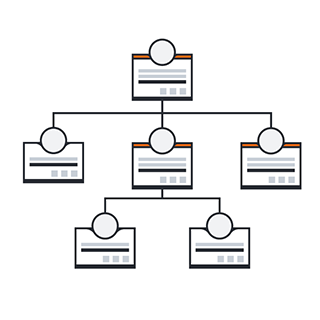One of the best ways to expand your reach and increase sales is to support brand advocacy. While promoting your product or service is primarily the job of your marketing and sales teams, the most sophisticated teams understand that creating advocates out of customers is the best way to ensure a consistent sales pipeline.
Consider the customer journey, where qualified leads go from discovery to purchase, and finally into retention and referrals. Studies have proven that retention marketing achieves a higher ROI than acquisition marketing and that referrals are the best way to passively build your sales pipeline.
With a reported 77% of customers claiming that they’d recommend a business to a friend after having a positive experience, the value of customer retention and referral can’t be understated. The best way to ensure that you are retaining customers and encouraging referrals? Investing in your champions. This article will highlight what a sales champion is, why they are important to the growth of your organization, and ways to set up your champion for success.
What is a sales champion?
A sales champion is your native salesman within your customer’s organization. A champion understands your vision, is invested in your vision, and is an advocate of your product or service when you’re not around. Champions typically exceed expectations, expedite onboarding, sign up for all extensions and add-ons, and receive great value from your product or service.
Ideally, sales leaders try to identify a product champion within every qualified lead organization. It’s not always possible to find this champion, however, which is why it’s so important to prioritize the champions you do have.
Why are champions important?
With any sales transaction, the end goal is to garner influence with your buyer or key decision-maker. In an ideal world, your champion is also your decision-maker, but when this isn’t the case, your champion becomes a crucial ally in winning influence over a buyer.
While there are various sales methodologies used by sales professionals to convert leads and influence buyers, let’s explore how sales champions work within the MEDDIC sales methodology. After first creating a relationship map identifying key decision-makers, the second step of the MEDDIC methodology involves providing your champion with the data, marketing resources, and any other resources they may need to win over decision-makers.
Think of your champion as your ambassador: they act on your behalf from a key strategic position. For this reason, champion relationships need to be nurtured and prioritized.
6 ways to set your champion up for success
As you identify champions in your qualified leads and current customer base, look for ways to support them and strengthen the relationship. Here are some ways to get started:
1. Stay in touch
Being a phone call or quick email away is essential as your champion advocates for you within the walls of the organization you’re courting. Whether it’s answering a question about a product, making a critical introduction, or simply checking in on the progress of the sale, being reachable is crucial to establishing a trust bridge that wins deals and creates repeat business.
Your champion is likely busy, so it’s important not to set the burden of communication on them. Set up a cadence where you regularly check in on them and reply to messages quickly as possible to eliminate any unused time from their plate. If you’ve established a relationship over text, be sure to reply promptly to any texts. Set up a Slack channel and be sure to connect them with any of your teammates whose input may be necessary throughout the sales process.
Draw up an account map to keep tabs on your champions and organize your communications. A champion is more than just a teammate—you are their enthusiastic assistant as they navigate the sales cycle.
2. Celebrate their wins
One of the most powerful tools in sales acquisition and lead generation is customer testimony. An enthusiastic champion provides tremendous value not only in advocating for your product or service within their own organization, but in communicating externally via your marketing materials and public platforms. Use this to your advantage and get creative—celebrate your champion by spotlighting them on social media, featuring them in press releases, inviting them to webinars, hosting them for keynote speaker engagements, and honoring them with company awards.
Celebrating your champion’s wins provides twofold value. First, it demonstrates to your champion that you are invested in a symbiotic relationship that benefits both parties. Additionally, it allows you to put your money where their mouth is—a positive word from an outside source is worth a hundred from the source itself.
Some champions don’t want public recognition, and that’s okay. Celebrate these champions internally to acknowledge the key sponsor and any key team members he or she may have worked with, or consider sending them a gift as a token of your gratitude for their service.
3. Provide resources
When your sales champion is well-informed on your product, it makes the sales process that much easier. Make their job easier by providing them with as many resources as possible to help advocate for your product or service. Instead of relying on them to explain your product or service to their decision-maker, offer them a product demo. Rather than having them set up conference calls to check in, offer them a conference line, or take over the responsibility of scheduling altogether.
Any chance you have to provide a resource to your champion, whether it be time, materials, or energy, take it. Your investment in your champion is ultimately an investment back into your organization. Some resources to consider offering may include product overview videos, marketing materials, customer testimonial content, and product demos.
4. Provide training
If your champion is essentially an internal salesperson, they should be trained like a salesperson. Teach them about how your product or service functions, who it’s designed to serve, and the unique value that it offers. With this deep understanding, your champion will be able to confidently demonstrate your product’s unique value proposition.
5. Listen to their ideas
Throughout your sales process, you need to be an active listener with your champion—it may be what converts your lead to a champion. From the onset, listen to the pain points within their organization. This insight will give you the best idea of how your product or service may provide value.
As your champion explores and evaluates your product, listen to them as they express their concerns, reservations, and any comparisons to experiences they’ve had in the past. All of this information is invaluable not only in informing your future sales processes, but in building a unique, trusting relationship with what could become a long term customer.
Once you've successfully closed the deal and onboarded the product, don't stop listening. Take time to talk to your champion about their ongoing experience with your product. And here’s the most critical piece: pay extra attention to any negative feedback. By virtue of the trust you’ve established and the enthusiasm they’ve expressed in your product, a champion is the perfect source of low-risk constructive criticism to make your product or sales process even better.
Also, don’t assume that your champion will always be an advocate. It’s important to continue to listen to their feedback and keep winning them over with consistent outreach and communication. Inviting champions to customer councils, providing a clear process to make product or service suggestions, and keeping them informed on product changes are all great ways to keep your champions engaged.
6. Incentivize them
Most organizations have commissions or referral bonuses built into their marketing model. If you don’t, consider offering your champion a chance to benefit from their advocacy while growing your company. A referral in business is invaluable and sales leaders who recognize the value of referrals and offer commissions to third parties who generate qualified leads can leverage the benefit of a broader network and build a passive stream of leads. Your champion already believes in your product—offering them a quantifiable benefit will only sweeten the deal.
For sales leaders at organizations of all sizes, a focus on customer retention and customer referrals provide the highest return on marketing investment. Champions are at the center of both retention and referrals and they must be a top priority in your sales strategy.

See more, know more, sell more. Lucidchart serves as a dynamic roadmap to help your team close bigger deals faster.
Learn moreAbout Lucidchart
Lucidchart, a cloud-based intelligent diagramming application, is a core component of Lucid Software's Visual Collaboration Suite. This intuitive, cloud-based solution empowers teams to collaborate in real-time to build flowcharts, mockups, UML diagrams, customer journey maps, and more. Lucidchart propels teams forward to build the future faster. Lucid is proud to serve top businesses around the world, including customers such as Google, GE, and NBC Universal, and 99% of the Fortune 500. Lucid partners with industry leaders, including Google, Atlassian, and Microsoft. Since its founding, Lucid has received numerous awards for its products, business, and workplace culture. For more information, visit lucidchart.com.

